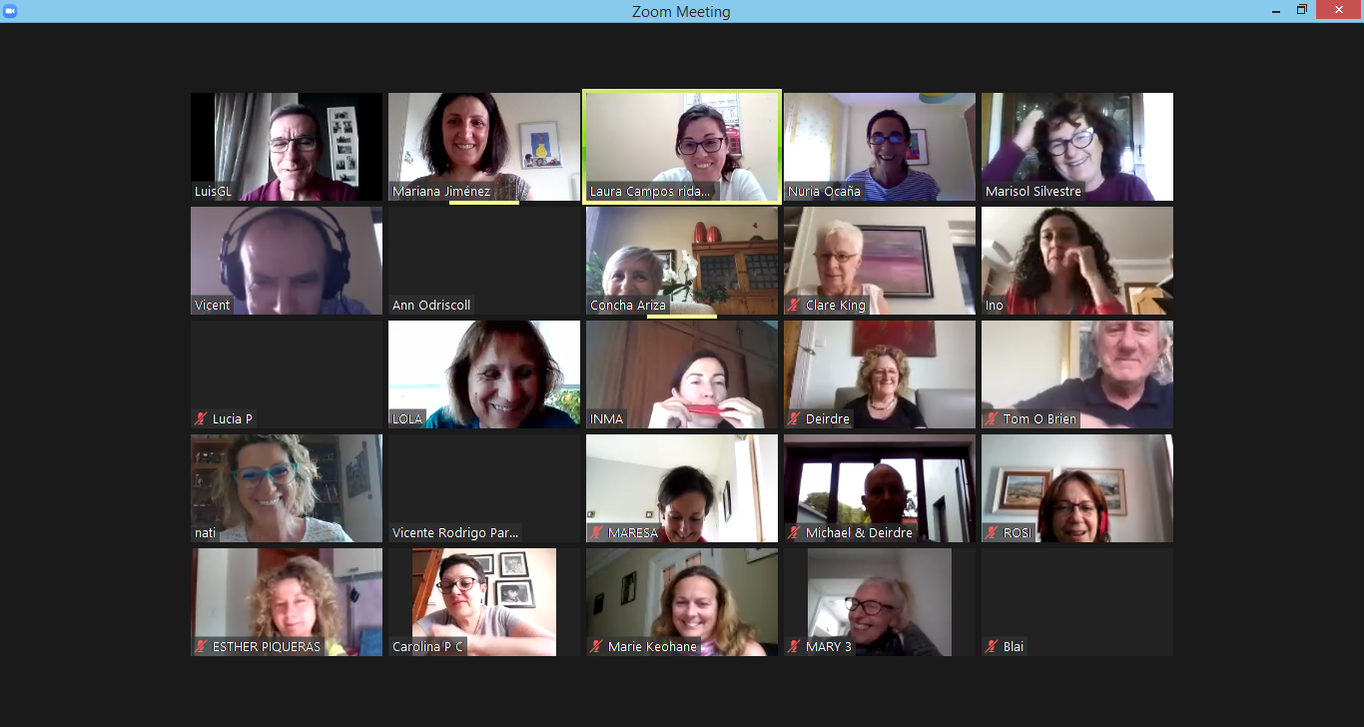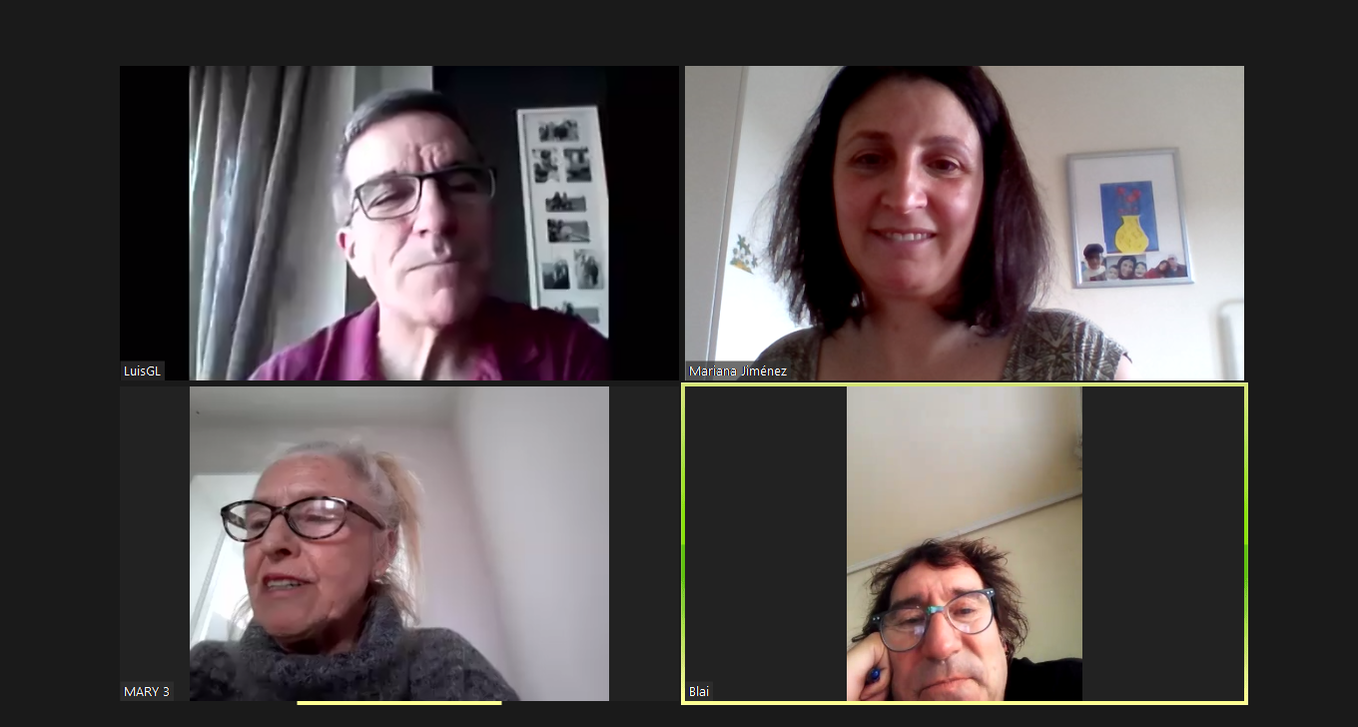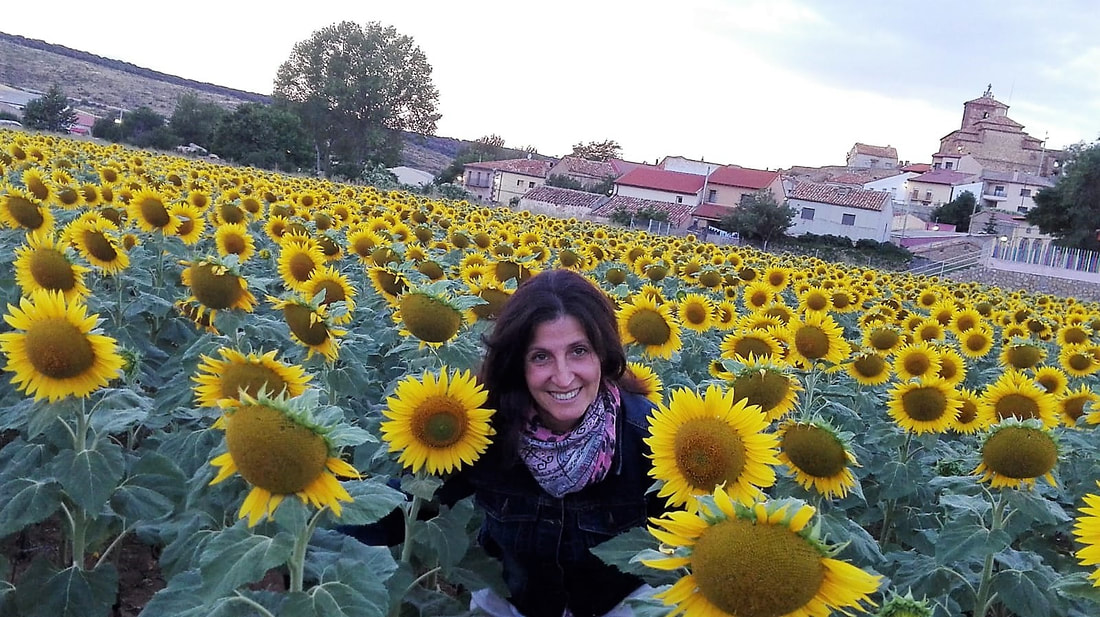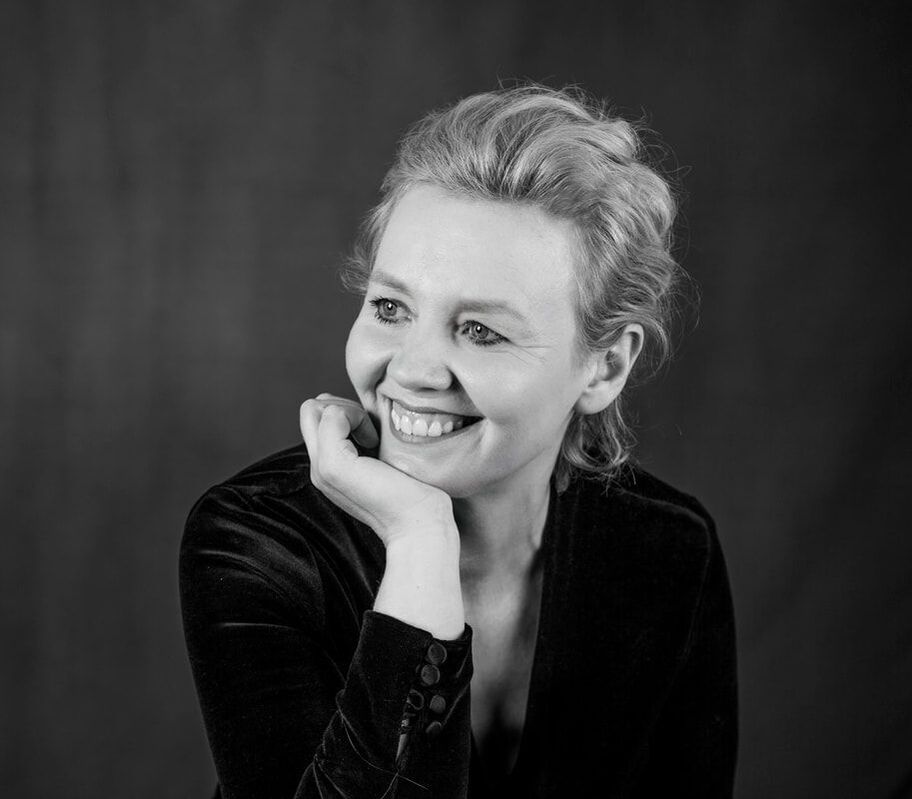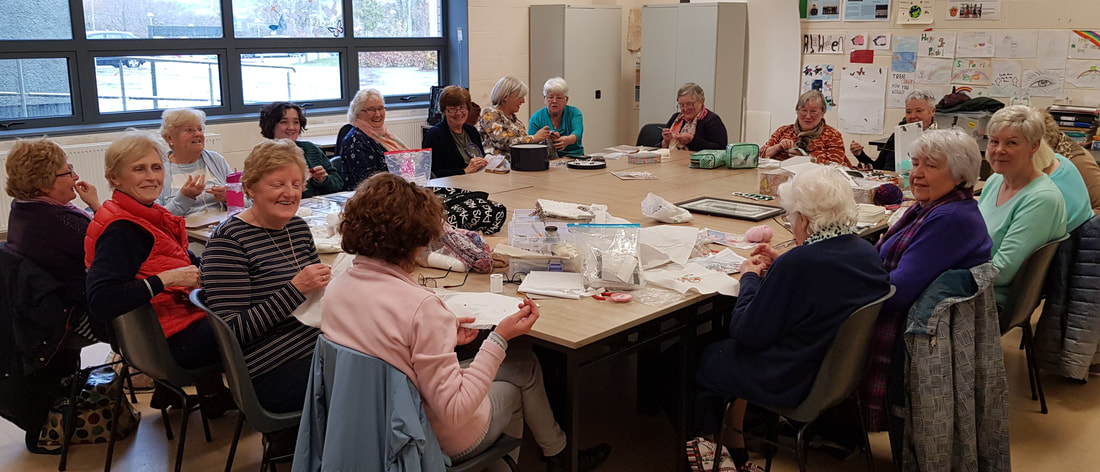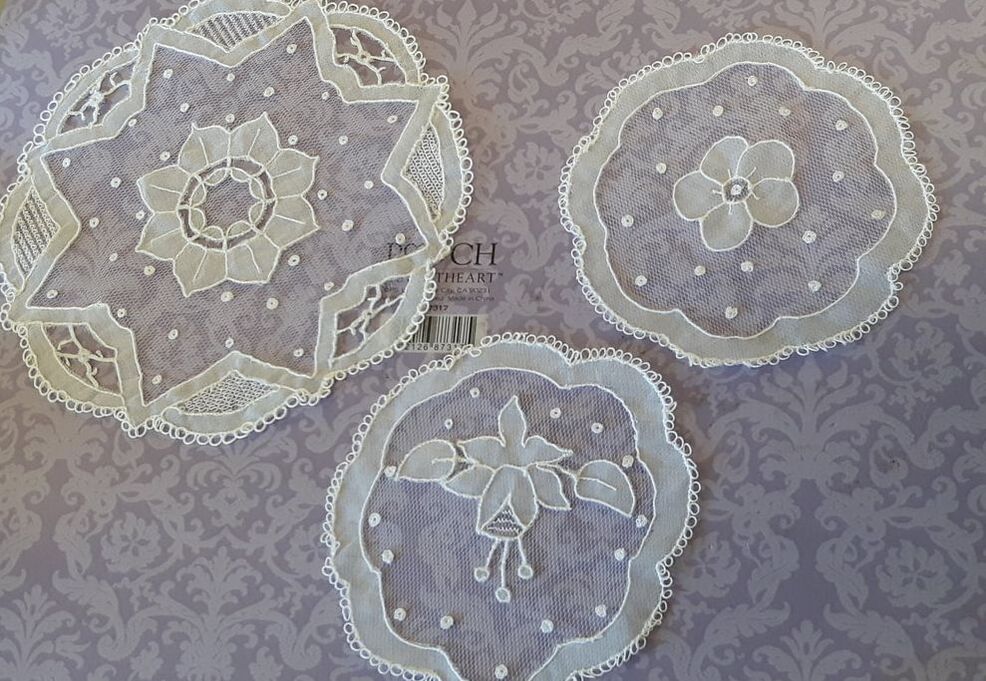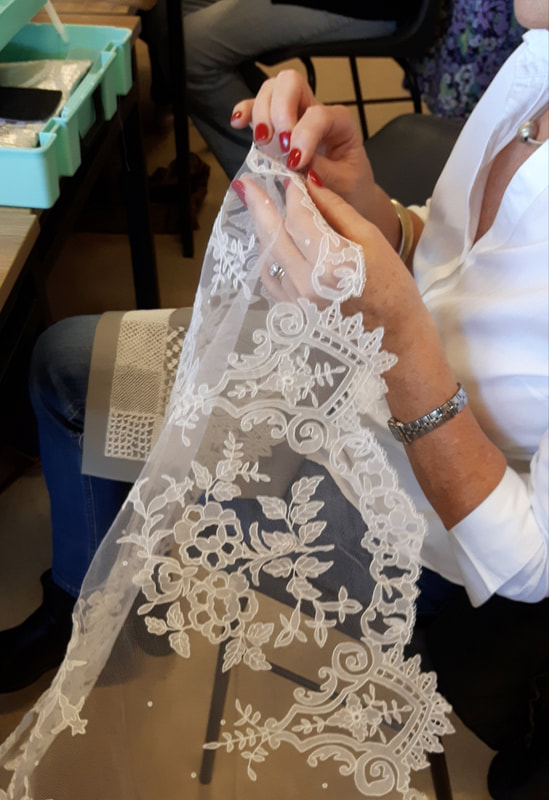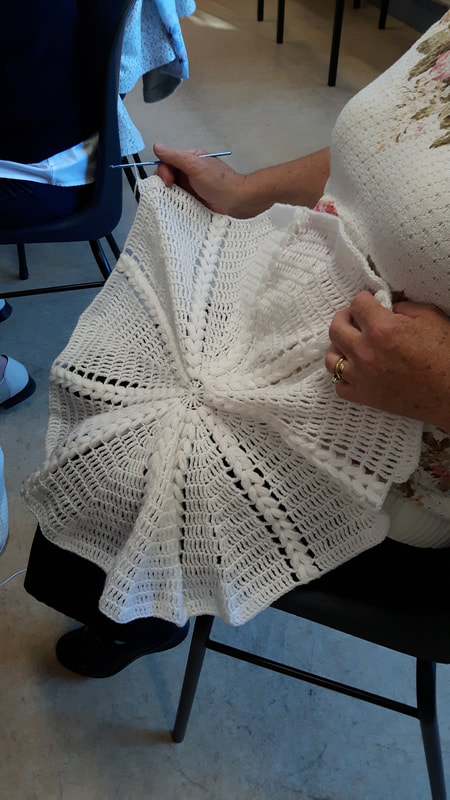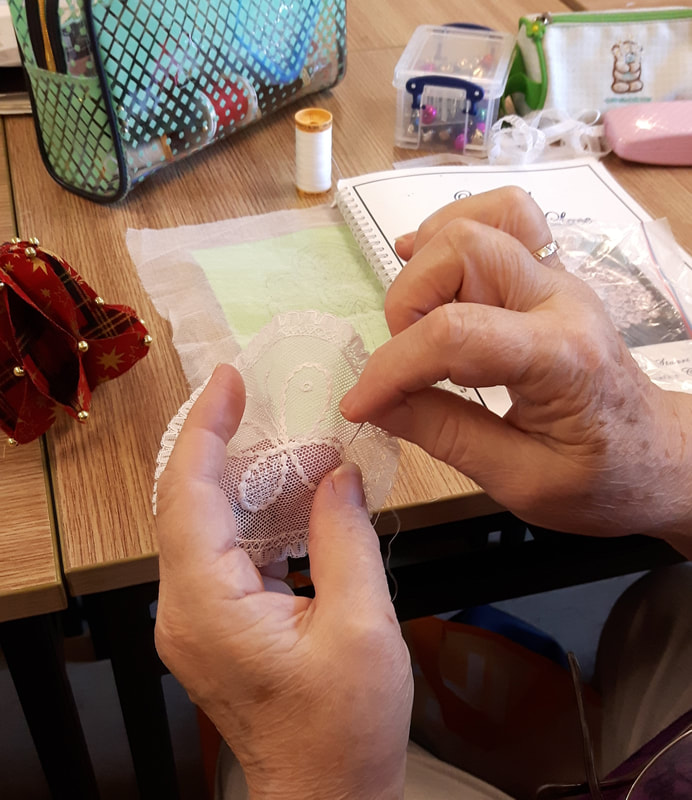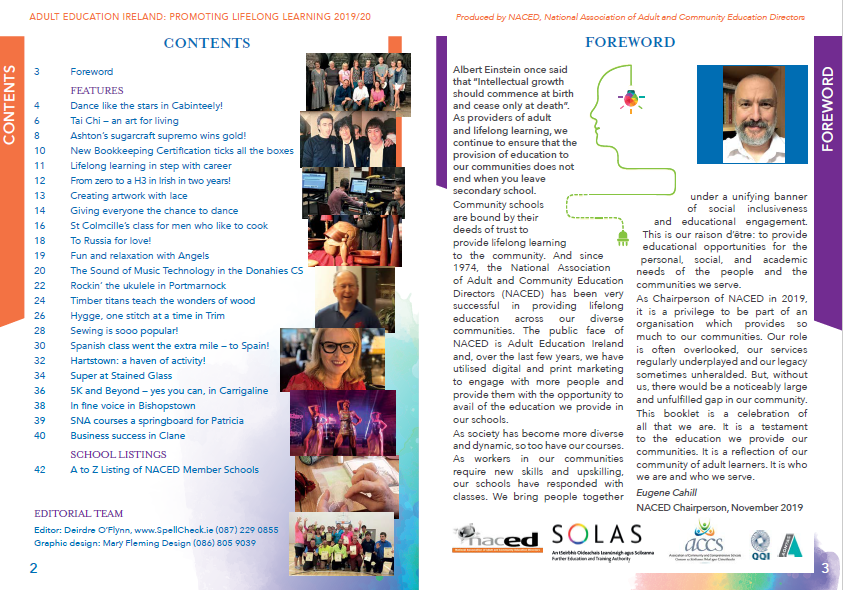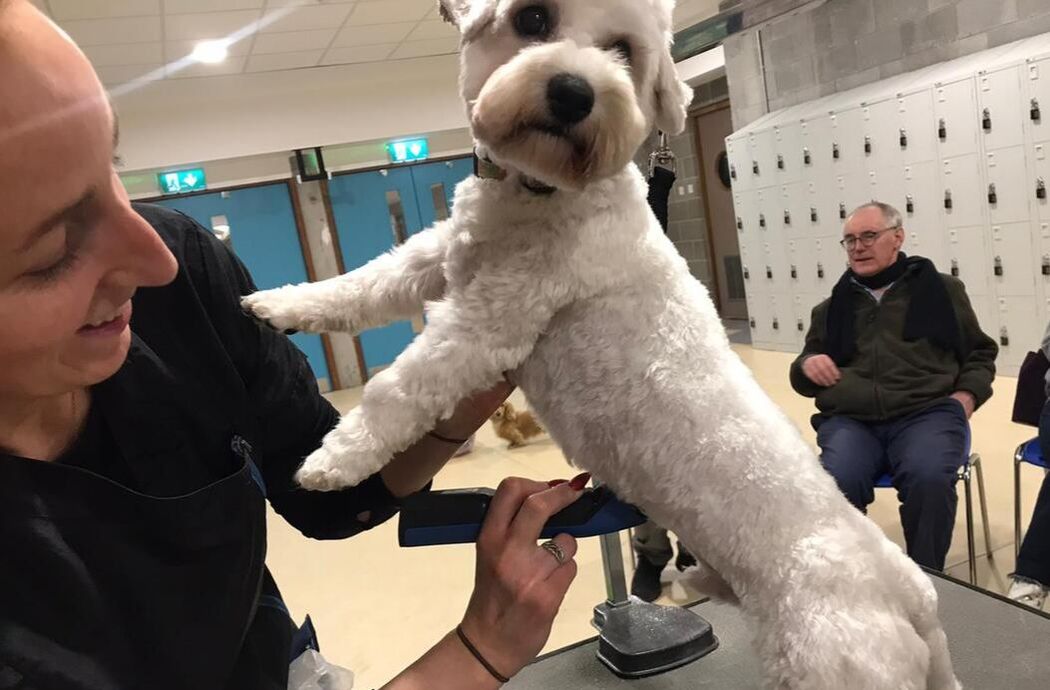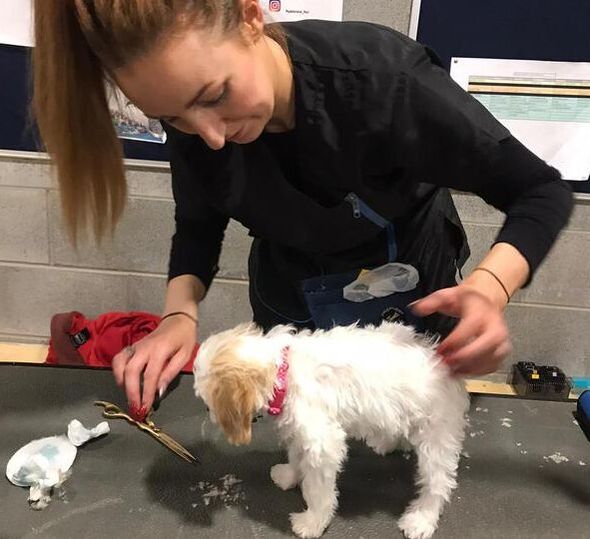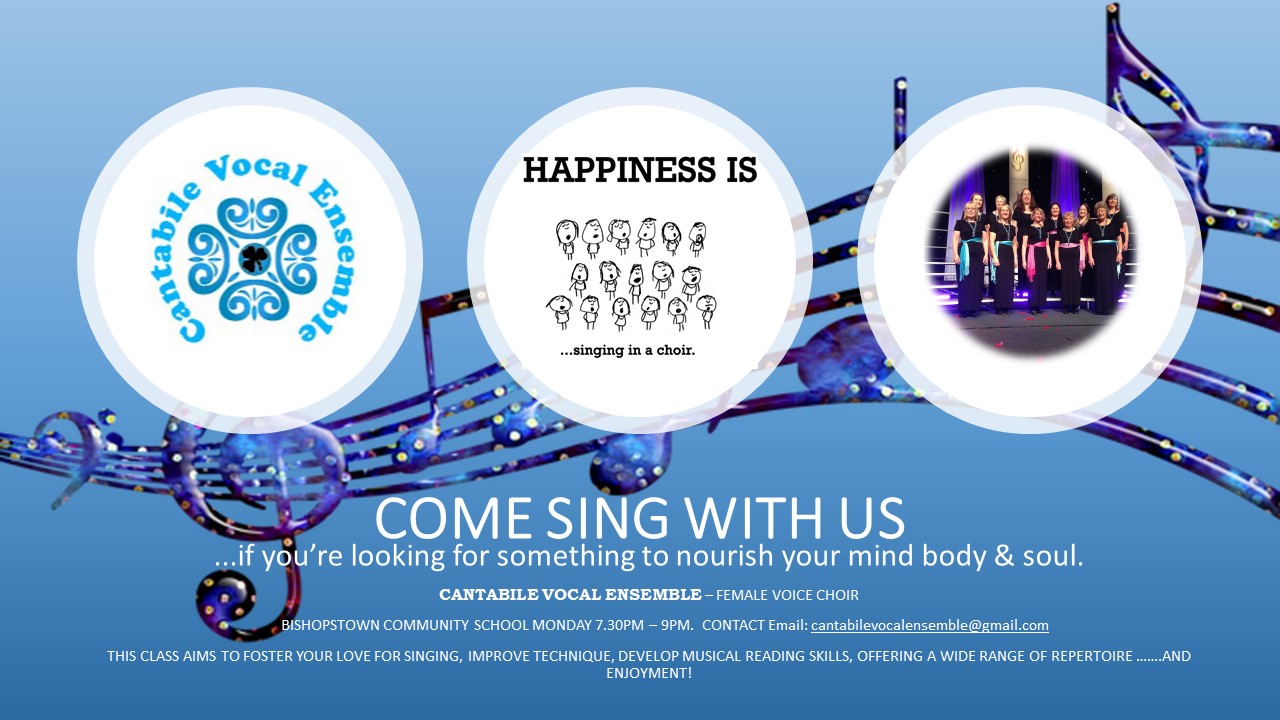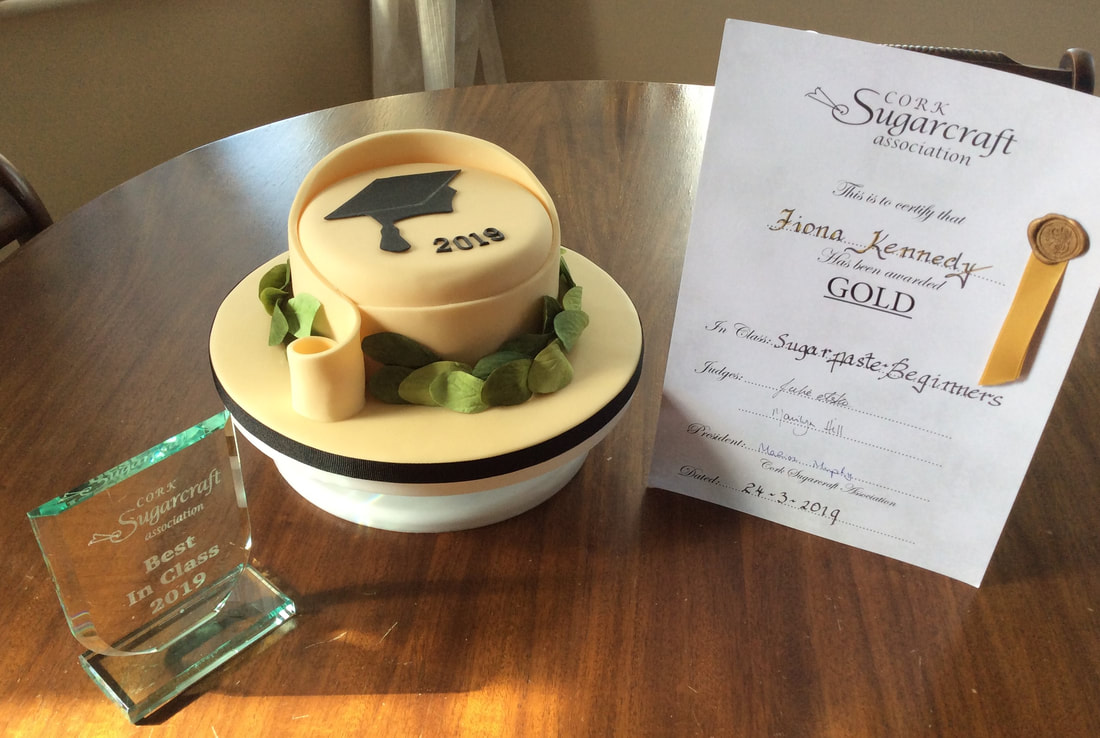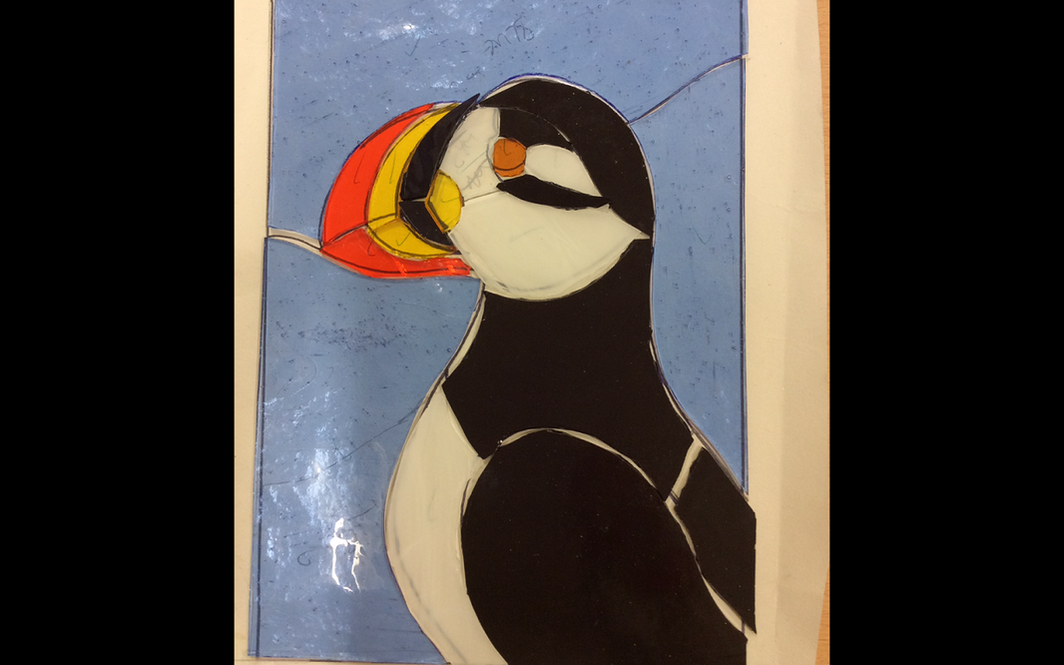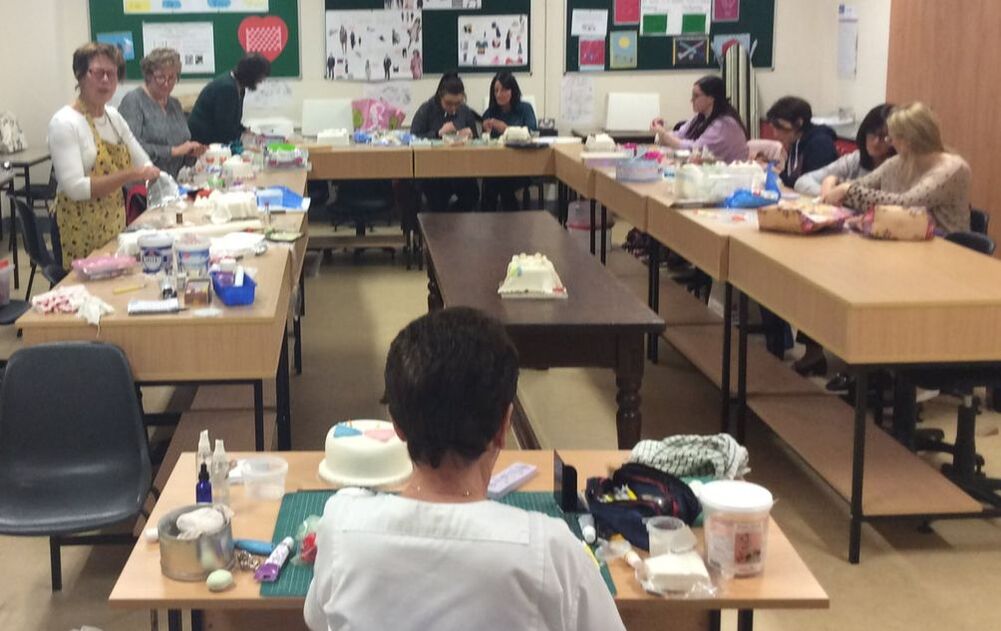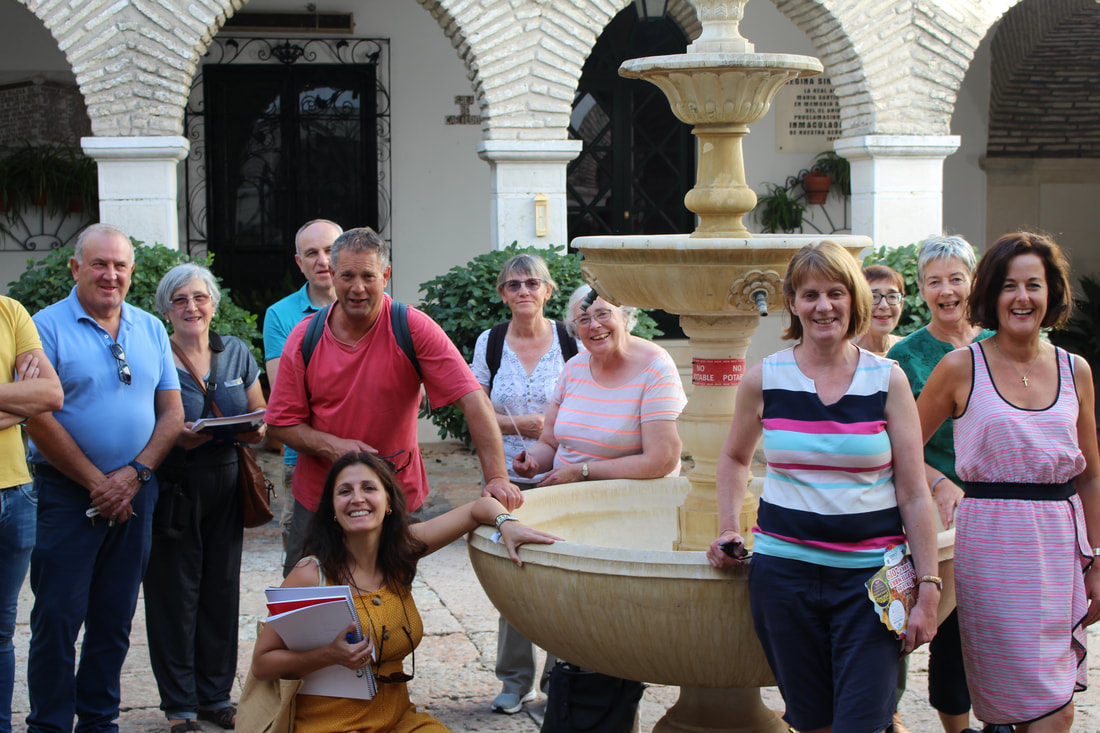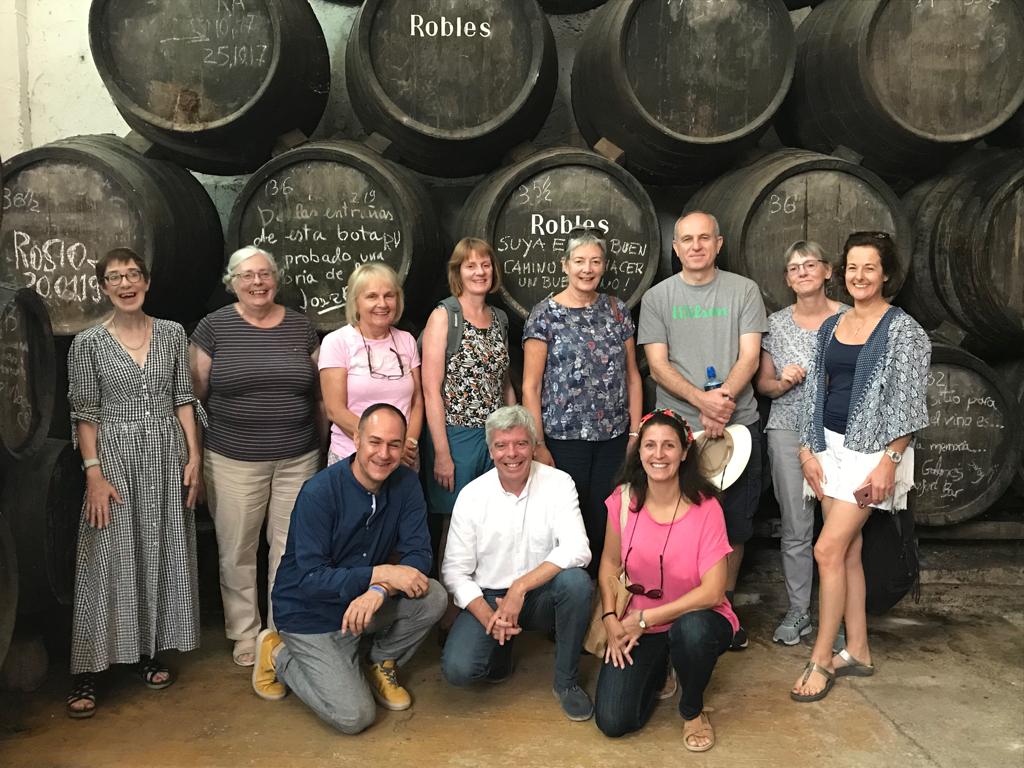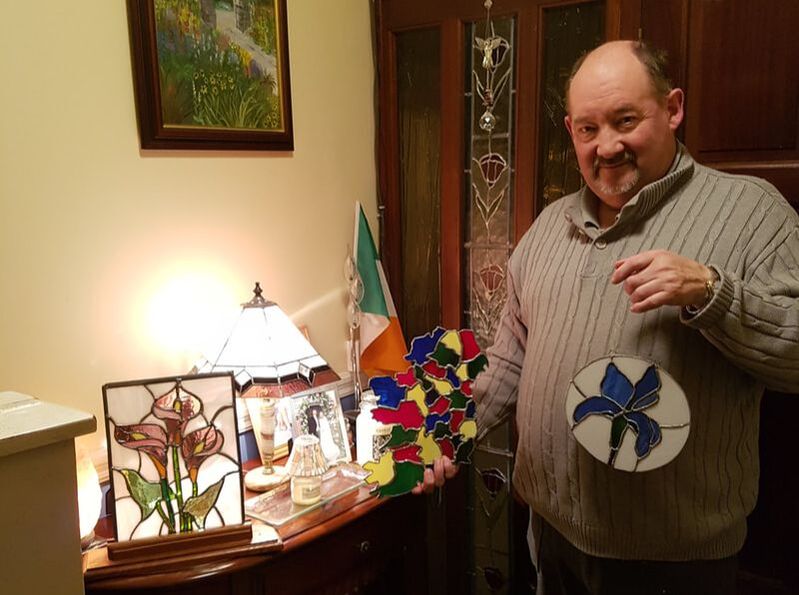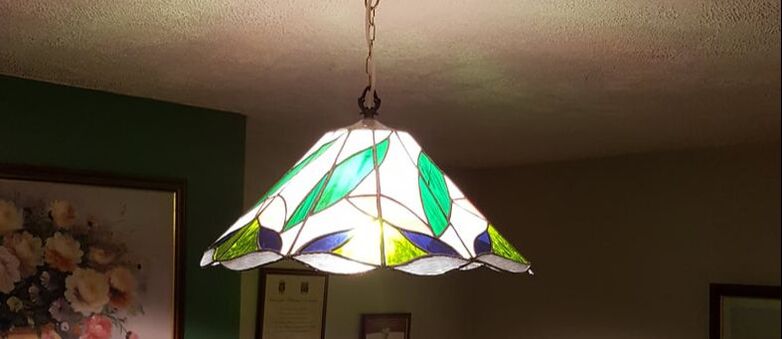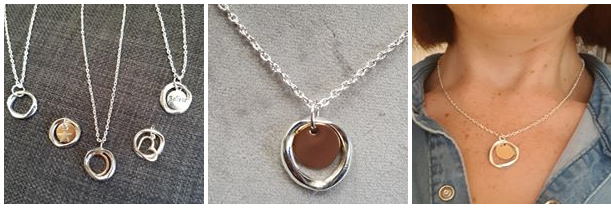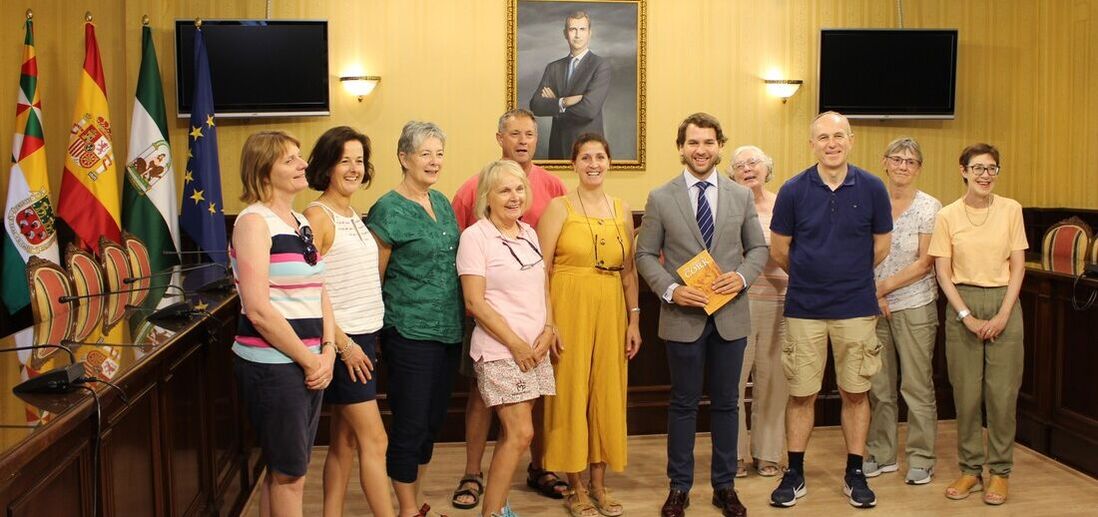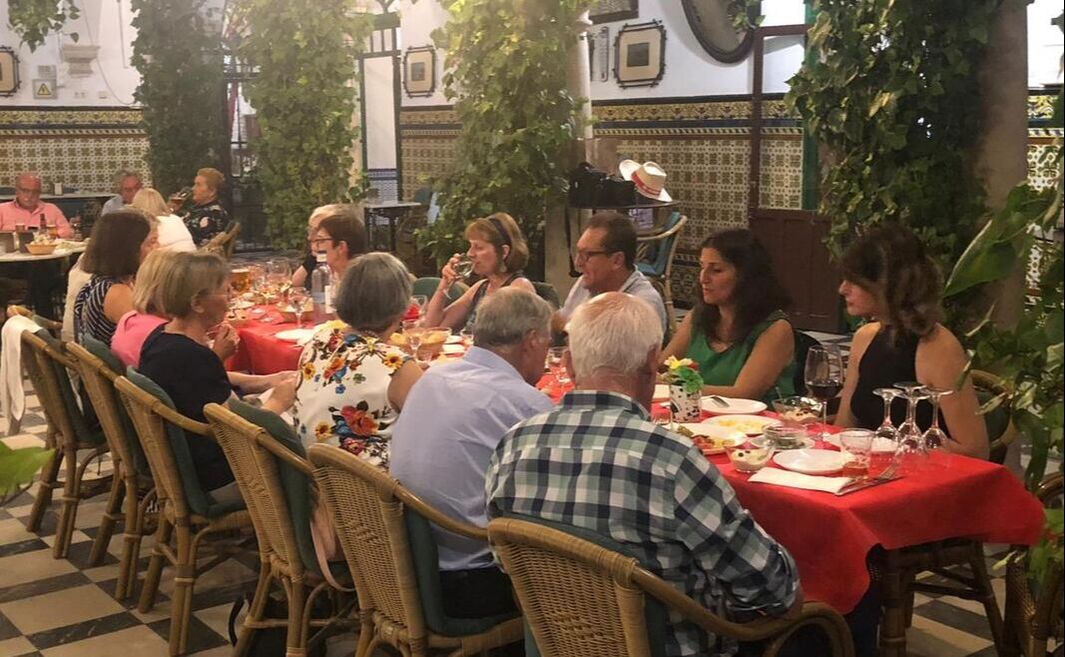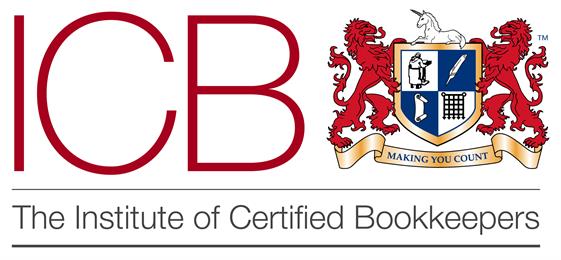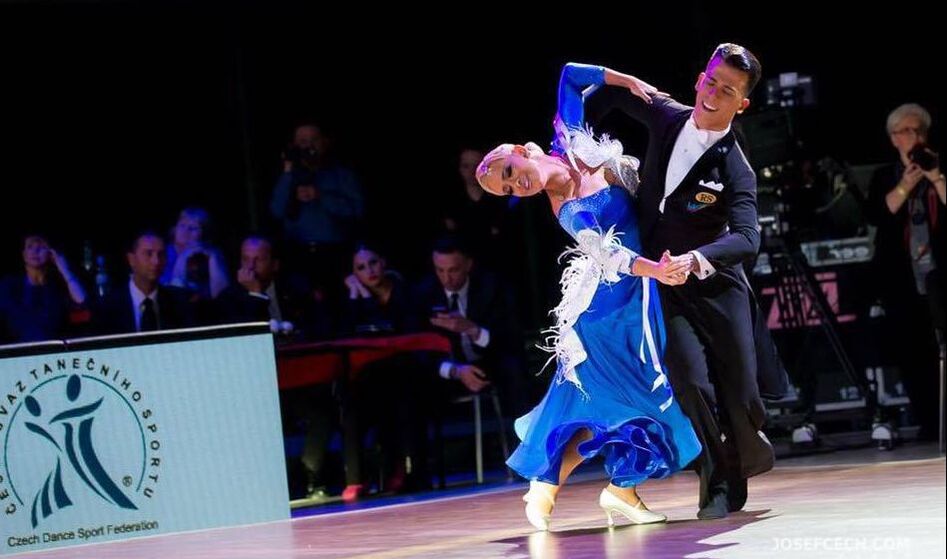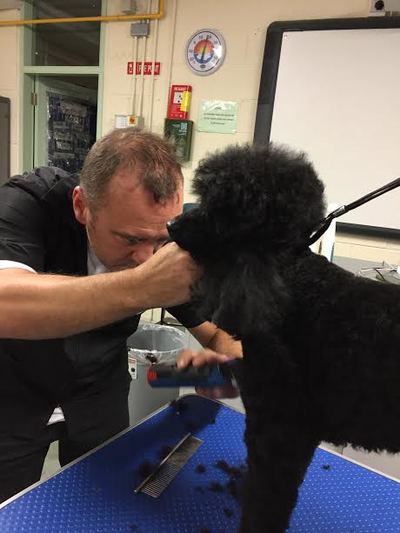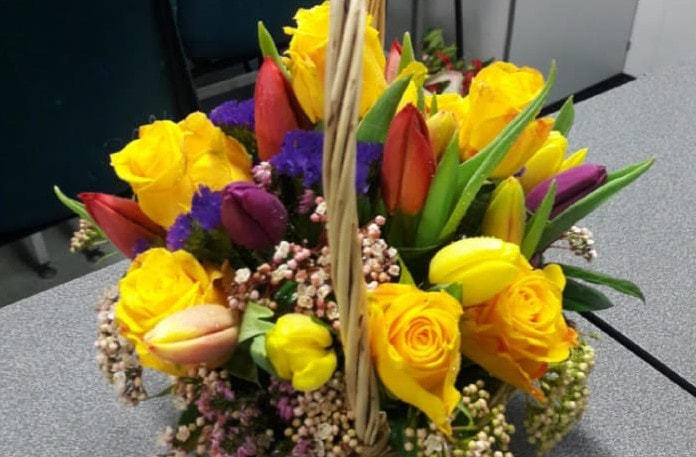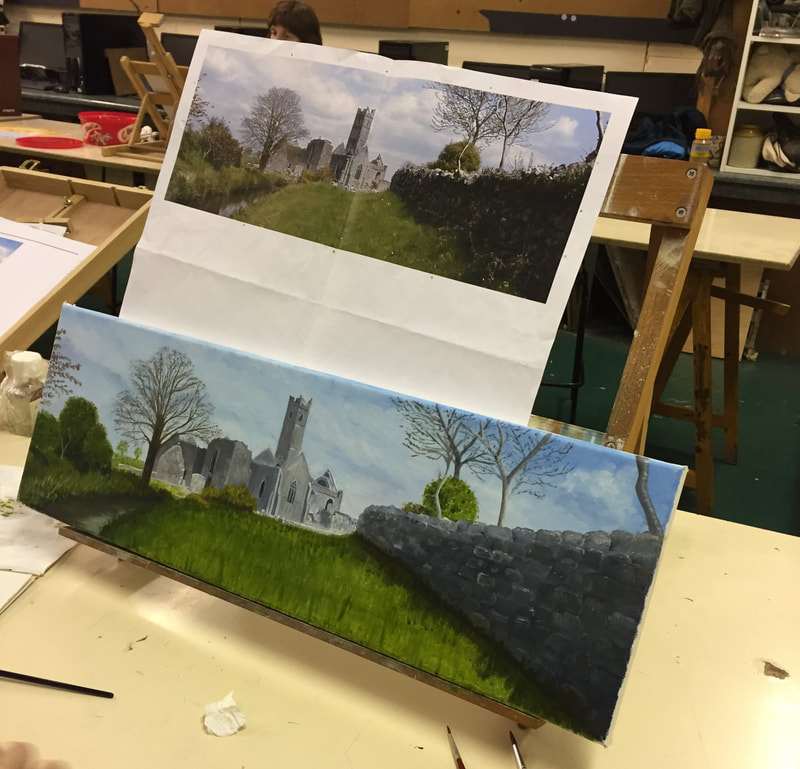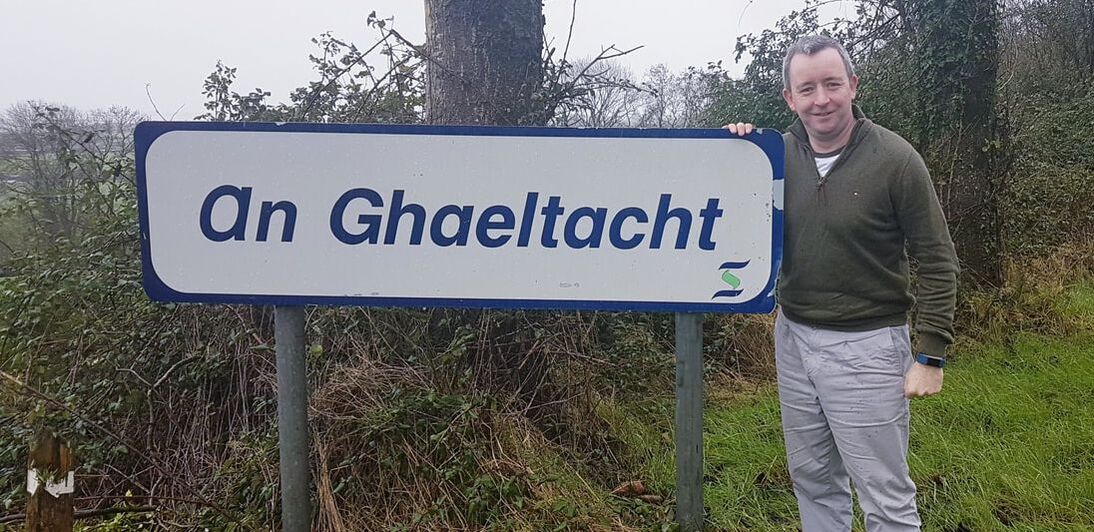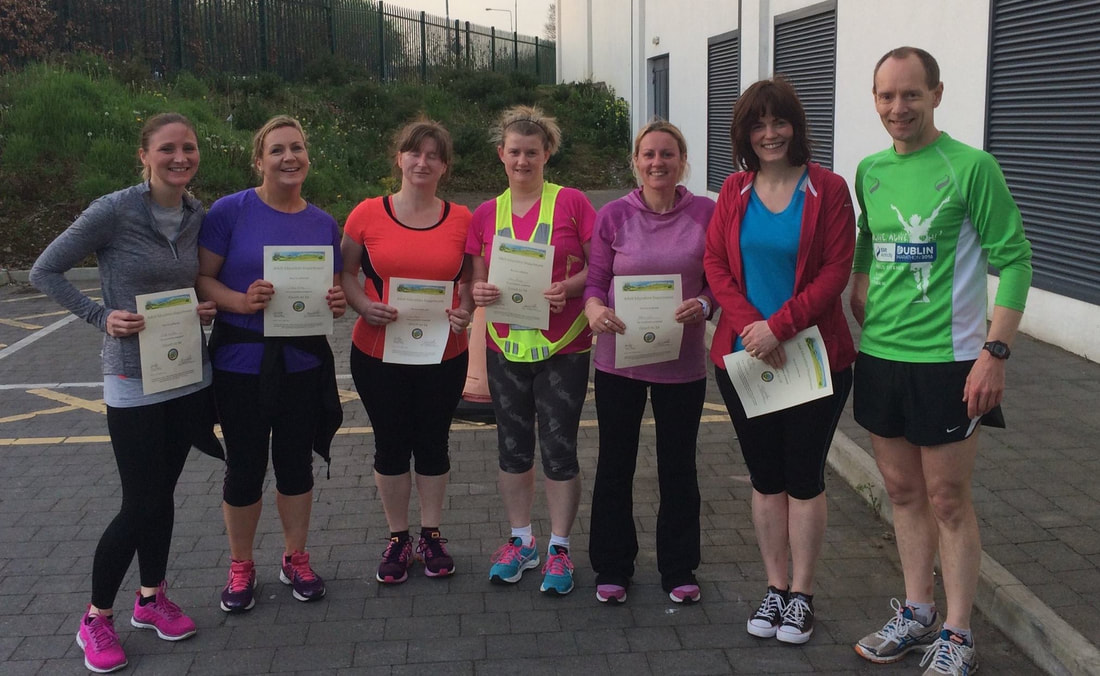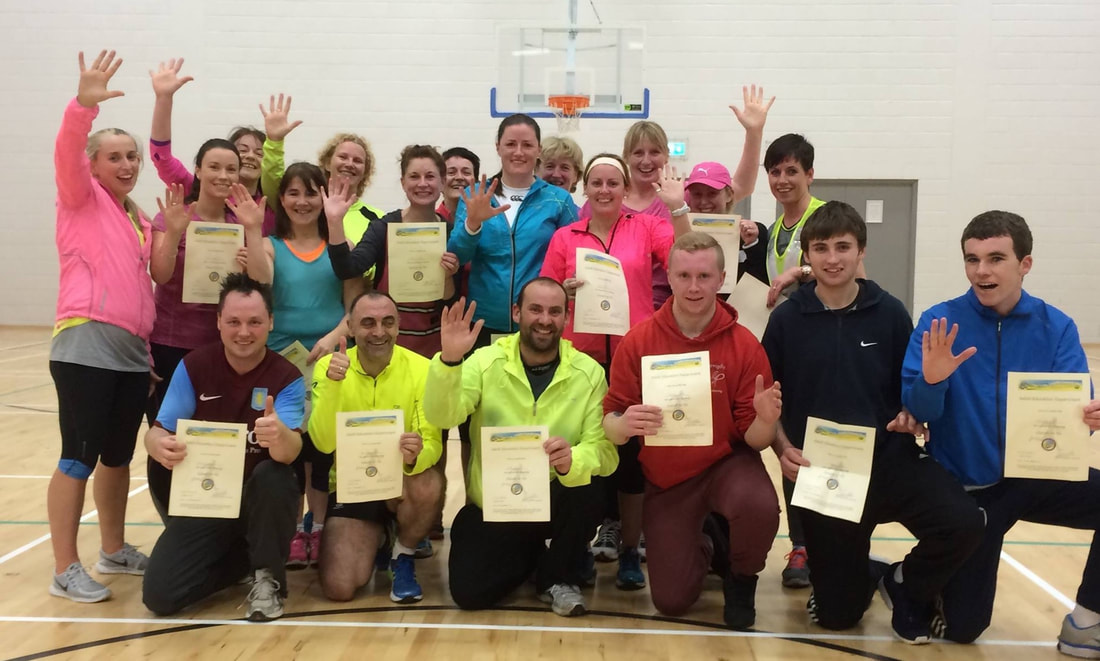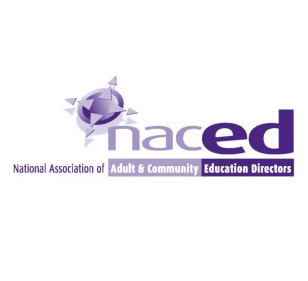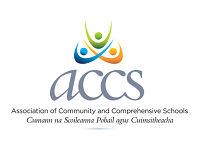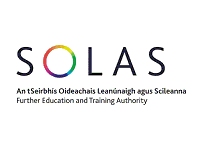|
When a proposed visit to Ireland by Spanish students was called off due to the Covid-19 pandemic, the organisers turned to technology instead. Spanish tutor Mariana Jiménez Moreno, who delivers beginners and advanced Spanish night classes in Cork, tells the story: “In January, a group of adult Spaniards in Valencia who were doing English classes put together a plan to visit Ireland in April. Nuria, the person who organised the trip, contacted me looking for Irish students here who were learning Spanish. I introduced the idea of the exchange in my classes then. Students interested in doing it recorded a series of videos introducing themselves and describing their cities. We were getting ready to welcome the Spaniards in Cork on April 16 - but everything stopped with the lockdown. Classes were suspended, so I waited for a month to see if the classes would resume. When it looked like classes were not going to resume, I contacted Nuria, the Spanish students' organiser in order to promote an online exchange between students from Valencia and Cork. Vicente Rodrigo, another Spanish adult education tutor, joined us in the idea. So, the three of us decided to support our students and provide them with tools and resources to keep them going in their language learning process. The plan was to hold group exchanges through video conferences using Zoom among our students and to promote online one-to-one exchanges. The main objective of the videoconferences was to create a platform where connections among students could be created with the support of their teachers, as well as to engage the students during these difficult times. We did the online exchange in May with 27 students from Cork and Valencia. The feedback from the students was that they liked being in contact with native speakers of the English and Spanish. Participants were eager to learn and share and they learned that daily practice is essential to be able to carry on a basic conversation in the language they were learning. They also learned to speak with more confidence and fluency, and slower; to overcome shyness and to improve their pronunciation. The online exchanges were also an opportunity to speak and use what they already knew as well as an opportunity to work on their weaknesses.” Mariana Jiménez Moreno delivers beginners and advanced Spanish night classes in Bishopstown Community School, Ballincollig Community School, Ashton Comprehensive School, and Carrigaline Community School. Last year, in simpler times, she took her adult learners on a trip to Spain.
1 Comment
During the COVID-19 lockdown, many people have been turning to the night skies for entertainment! And they have delivered. The many clear nights have provided plentiful opportunities to spot everything from space stations to supermoons, as well as all 5 of the bright planets. John Daly, the tutor on the Astronomy adult education night course at Malahide Community School, wrote the following piece to help get you hooked on the simple, yet rewarding, activity of astronomy. Why Astronomy?Down through the ages, humanity has been captivated by the glory of night sky. It has always invoked a sense of wonder, curiosity and awe. “What are we looking at? How far away are these twinkling and shimmering stars? Is there life, even intelligent life, out there?” The study of astronomy holds the key to unlocking many of these amazing mysteries and the good news is that it need not, in any way, be an arduous undertaking. Many online courses, as well as courses in adult education settings, are now available for those wishing to take their first tentative steps in this exciting subject. Generally, no prior knowledge at all is required, only an interest and a willingness to learn! And nothing more than a pair of basic binoculars need assist you in your adventure! Beyond the surly bonds of EarthWe now live in a golden age for studying all that lies beyond "the surly bonds of Earth". Amazing discoveries have helped answer many of the intriguing questions posed by our ancestors. We now know, for example, that all of those shimmering stars are, in fact, distant suns and that most of them have their own families of planets orbiting them, as in the case of our own solar system. In fact, we know of almost 4,000 of these distant extrasolar planets! We also now know that many of the stars we see in the night sky are actually no longer there! Many have “winked out“, or blown themselves apart, but any evidence of their demise has not yet reached us, because of their unimaginably massive distance from us. So, when we admire the stars, we are in many cases gazing at ghosts! What to look out for this summerAnd it’s not only the stars that hold fascination for us. In the course of a year, the other planets in our solar system grace our night sky for months at a time. Indeed, this month of June sees the arrival of two of the most fascinating objects for our attention: Jupiter and Saturn. The former always comes accompanied by its four Galilean moons, easily glimpsed in the aforementioned pair of binoculars and Saturn arrives later in the month with its incomparable ring system. And before summer ends, in August we have the spectacular display of the annual Perseid meteor shower to dazzle us! Want to learn more?Star gazing is, in itself, a wonderful and uplifting activity, but when accompanied by the knowledge and understanding that astronomy provides, it can be simply captivating! So why not sign up for that next Beginners’ Course in Astronomy that you see advertised? Remember, the sky’s the limit!
With Irish barbers remaining closed, due to COVID-19 restrictions, until 20th July, and with people getting out more, there's never been such a need for home haircuts. With that in mind, Daiva Dabuleviciene, professional barber and Pobalscoil Neasáin tutor, has put together some guidelines for a simple men's haircut using clippers and scissors.
Getting started
In the video below, Daiva takes you through the process step by step for a man's haircut using a number 3 clippers on the back and sides, and a scissors on top. She points out that you almost can't do it wrong, and that the most important is not to be afraid.
What you'll need
For this haircut, you will need:
Learn More
Daiva's barbering course at Pobalscoil Neasáin covers all you need to know about working in a professional barber shop, including Creative and Classic Cutting Techniques; Clipper Work; Fading & Blending; Styling & Finishing; Current Trends & Media Influences; Client Consultation; Product Knowledge and Working on Live Models. The course will be available for enrolment as soon as it is safe to restart courses.
A number of our other schools also run Barbering and Hairdressing courses.
Memoir Writing Memoir writing is a good place to start. This is not the story of your life. It is simply a collection of memories. Or even just one memory - a memory from your childhood or your teenage years. It could even be about this strange time that we are living in now. Memoir writing is about real life and the struggles and joys that we all face. Helpful tools1. Imagine that you are telling your memory to a friend. Then just begin. Write in your own authentic voice. The first draft of anything can be very sketchy. But once the first draft of any story is written you have your raw material. 2. Try to remember the details. If your story is set in your childhood home, write down what you remember. What was on the mantlepiece? What hung on the walls? What colour was on the walls? Was it paint or wallpaper? What was on the floor? Was there a dog? 3. Use the senses. If you were writing about the house you grew up in, what was the aroma? Was there an open fire, perhaps with turf? What did you eat? How did it taste? What were the sights, smells, and sounds of this house? Take time in describing them. 4. Use emotion. Try to remember what you were truly feeling and then write it as honestly as you can. 5. Rewrite or edit your story until you are happy with it. Then think of another memory. It could be a simple memory but one that means something to you. Before you know it, you will have a collection of stories to write. Memoir writing is a journey of self-discovery as the subject is you and it can be incredibly rewarding. It is up to you what you do with it. But your memoirs are an important piece of social history and their importance cannot be overestimated. Developing CharactersCharacters in fiction writing are not just part of the story they must drive the narrative, so it is crucial to spend time developing full-rounded characters that are compelling and believable. Take your time developing characters that are authentic. When developing your character, you must get to know them. How do they speak? What are their worries? Have they unusual traits? What is their body language? Get to know their physical traits, their passions, and their secrets. Allow the character to lead you, people are unpredictable and so are characters. Allow them to change the story. Let them be of their time. Most importantly avoid judging them. Some TipsPeople are characters so this is where you can get your inspiration. Try to notice how people behave. Everyone is unique. Every character is too. • Create characters that will surprise you. You should have lots of knowledge about you character. But they should always be able to shock you or surprise you. Never assume you know everything about your characters. • As your writing develops, so will your characters and allow them to change and do things that you never thought that they would. • Take time in finding the right name for each character. • Imagine how they would speak. Are they articulate? Are they well mannered? Or perhaps they are witty. Do they use body language when they speak? Are they loud? Or shy? Have they any unique traits in their voice? • What do they look like? Create a visual for the reader but allow them to have their own interpretation. DiscoveryDeveloping characters is a journey of discovery. The more you write about them, the more they will inspire your writing. But try to find a character that you are excited to write about. Then let them tell the story. Character writing is the essence of fiction writing so take your time in learning the craft of creating compelling characters.
Sometimes, fear stops us from ever writing our stories, but try to leave fear aside and just begin. Let it take you on that magic carpet. 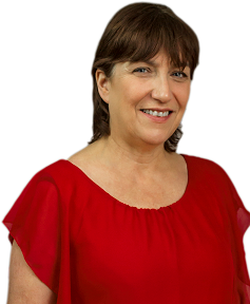 Mari Gregan is a tutor on the QQI L5 Nutrition certificate night class in Gorey Community School. Here, she outlines tips for eating well during the pandemic. During this time of uncertainty and angst, many of us reach for the fridge or snack cupboard for comfort. For many, that can be a normal human reaction. This is a time, however, when keeping our body well is more important than ever. The foods you eat affect your health and wellbeing. Eating healthily can reduce your chances of developing a lot of diseases. In fact, a good diet can improve all aspects of your life from brain function to your energy levels. Food affects every cell and organ in your body. 1. Avoid too much processed junk food.These foods are low in fibre, protein, and vitamins or minerals but are high in ingredients like added sugar and salt. Thus, they provide a lot of empty calories. These foods are engineered to trigger your pleasure centres, so you are tricked into overeating. For some, this can even lead to a food addiction. This includes sugary drinks. These are the most fattening items you can consume. The brain does not recognise the calories from fizzy sugary drinks like food. So, you end up eating way more total calories in the day. Fruit juice can be just as bad in this regard. 2. Eat enough protein.Eating enough protein is vital for good health. Try to include protein with each meal. High protein not only aids in the protection and health of every cell in our bodies, it has also been shown to lower blood pressure and blood sugar levels. Not only that, eating protein gives us the most satisfied feeling and keeps us full for longer, which helps us to avoid reaching for sugary snacks! 3. Eat fruits and vegetables.Fruit and vegetables are loaded with all the good stuff! They are packed with our essential vitamins and minerals and antioxidants. Include fresh, seasonal (where possible) fruit and vegetables in your daily diet. 4. Try to avoid eating a lot of refined carbs.Not all carbohydrates are the same. Some are highly processed foods where the good stuff like fibre has been removed. Stick instead to the whole grains and your fruits and veg. 5. Do not avoid fats in your diet.Fats are necessary in our overall diet. But look for good healthy fats, which do contain some saturated fat. Healthy fats include olive oil, avocados, nuts, chia seeds, dark chocolate, and fatty fish. 6. Take a supplement of vitamin D.Exposure to just 15 minutes to sunlight on your face and arms gives you all the vitamin D you need in a day. But if we are not getting this, it is beneficial to take a supplement. Vitamin D helps the body to absorb calcium which aids bone health. It also plays an important role in our immune health. Other foods to aid the immune system include broccoli, garlic, peppers, spinach, almonds, ginger, green tea, kiwi, and turmeric. 7. Keep hydrated.You need to drink adequate amounts of water for good health. Authorities commonly recommend eight 8-ounce glasses, which is about two litres. 8. Combine healthy eating with other beneficial habits.Exercise with a good diet can help maintain optimal health. It is also crucial to get a good night’s sleep. Remember, that stress also plays a vital role in how we digest the nutrients from our food, so it is helpful to learn ways to help minimise our stress response.
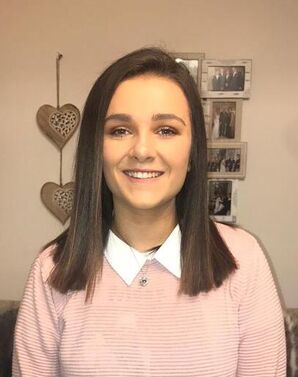 Lauren Ryan has more reason than most to learn Russian – her boyfriend was born in Russia and she will be hoping to converse in his native tongue when they visit Russia in the next few years. “I took the Russian beginners class in Coláiste Chiaráin in Leixlip to learn his language,” says Lauren, who loves languages and took on Irish as an extra subject in her degree. “And I wanted to do something to challenge me after I had finished my degree. “I’m absolutely loving it. Whilst I have a good grasp of speaking Russian, I wanted to improve my reading – the Russian alphabet is completely different. But it’s so much easier to learn Russian when you can read it, as it is literal and phonetic. Once you can read it, you can sound it out.” Passionate tutor With seven people in the group, there is great variety – and tutor Rodica Darii comes in for great praise. “Rodica has a great way of explaining everything and she talks us through what we’re doing so that it’s easy to understand. She also finds new things for us to do at home so that we practice during the week. She puts her heart and soul into it.” Russian pride “People in the class want to travel in Russia and be able to speak the language, which I think is great. The class makes is so that you wouldn’t be apprehensive now about speaking Russian. “There’s a massive Russian community in Ireland and Russian people are so proud of their language and heritage. And I think it’s really cool that people here are learning Russian for their own personal reasons.” For Lauren, being able to communicate in Russian now means she can text her boyfriend’s mother in Russian! Mary O’Sullivan has been attending the lace making class in Ashton Comprehensive School for five years. She tells us of her experience in the class: “This class was a totally new experience for me. During Heritage Week over five years ago, I went to a Lace Expo in Cork and was intrigued by what I saw. Veronica Stuart, our tutor, was there that day and she recommended the class in Ashton. Veronica is one of the longest-serving tutors in the school. “Everybody makes different pieces, with lace, crochet and embroidery. I'm working on a table runner of wildflowers of the forest. It is Mountmellick Lace style which is unique as it is the only form of white-on-white embroidery from the Nineteenth Century which can claim to be entirely Irish in origin and design. “It is brilliant to learn a new skill and I have made all types of lace at this stage. Most of the class return each term and we are very welcoming to new joiners. It is sociable and we sometimes display our work and go to exhibitions out of the school. Since starting the class, I have also become a member of the Irish Lace Association.”
The 2019/20 version of the Adult Education Ireland lifelong learning booklet, a celebration of adult learning at NACED schools, has just been published. Featuring the articles and interviews which have appeared on this site over the past 12 months, the second edition of this booklet tells the stories of many students and tutors across a range of hobby and certified courses. Print copies of the booklet will be available at any of our member schools, and the electronic version can be downloaded here.
In Hartstown Community School in Dublin, evening classes range from aerobics to Zumba, boot camp to computing, DIY to pottery, gardening to oil painting, Asian cooking to photography, crochet to yoga and lots, lots more! Here, a student and tutor tell us of their experiences … Lifelong learner Ger Keegan loves the night classes in Hartstown Community School. “Every year, I look at all the local brochures and, inevitably, I end up going back to Hartstown,” says Ger, who has just completed a Dog Grooming night class and is currently participating in the Meditation and Mindfulness class. “I feel things are well-organised and the place is lovely and warm. I find everybody lovely there and I love the cup of tea in the middle of the class – you get to chat with the others and it’s a great social element to the night.” The Dog Grooming class was just the ticket for this dog lover. “I found it terrific, very informative. The tutor, Louise, was wonderful – as well as grooming, we covered positive reinforcement and feedback to the dog.” This practical hands-on course also includes dog handling, brushing, bathing, clipping, ear cleaning, nail clipping and dental care. “Louise brought in a different type of dog each week and her grooming table and showed us great tips to help everyone keep their own dogs tidy at home. “It was a most enjoyable class – you wouldn’t want to miss one!” A tutor’s tale On Tuesday nights, tutor Jason Deegan teaches the fundamentals of drawing in the Drawing for Animation, Cartoons and Comics class. It covers everything from designing and posing your own characters to an introduction to visual story-telling from Jason, an animation artist with 20 years’ industry experience. It is ideal for those with an interest in animated film, video game design or comic art. “I designed this module myself,” says Jason, adding that the animation field in Ireland is booming at the moment. “The class appeals to adults who have done some drawing and want to produce their own comics or characters. We cover everything from perspectives to storytelling, comic panels, storyboard panels – the focus is very much on drawing characters. “Storyboards are still used to create storylines, so drawing is still important, even if a lot of TV animation is done on CGI – computer generated imagery.” No surprise then that the class is still drawing a crowd … !  The animation class focuses on drawing characters. The animation class focuses on drawing characters. Modules in QQI L6 and L6 Special Needs Assisting are a great way of getting into a new line of work. Here are two stories of how the SNA modules changed the lives of two night class students:
Cashel For Patricia Fitzgerald, returning to education after 16 years led to a QQI Level 5 qualification, undertaking a Level 6 qualification, and a good prospect of employment. “I completed the Level 5 module in Special Needs Assisting,” says Patricia, who’s able to walk to the night class in Cashel Community School, Co Tipperary, as she lives locally. Local access “I found the night class great – it was easier than if I had studied for it on my own. I was out of education for 16 years and it has been great going back. The tutors are brilliant and the notes were helpful. Level 6 is definitely more intense and I would recommend that people do Level 5 Special Needs Assisting first. “For me, having night classes in Cashel Community School is great because I don’t drive, so it is very handy. And I was also able to do my work placement locally, and I stayed on after my work placement to work as a volunteer. Employment “You’re also fully employable with the SNA modules. I’m currently working as an SNA and [at the time of writing] interviewing soon for a full-time position. “For me, the classes were great for my confidence. I didn’t think I’d be able for anything like that. The Level 5 and work placement were great – I learn as I go and the course gave a great insight as to what the SNA work involved.” Lifelong learning Patricia’s involvement with the school shows the role of community schools in their communities. “I went to school there myself, did a Post-Leaving Cert course there, and now, my children attend the school as well.” And, when she was ready, Patricia turned to her old school to continue her lifelong learning journey. Less than a year after returning to education, Patricia has boosted her skills and her confidence - and her chances of securing full-time work. “I love it and would recommend it to anyone!” A new chapter for Portmarnock’s librarian Sheila McWilliams was the school librarian in Portmarnock Community School, Dublin for five years and has recently moved into her new role as a Special Needs Assistant this year having completed the QQI Level 5 module as a night class. Next up, Level 6 “and I’m going to keep going as far as I can go with it”, she says. Everybody needs to know more about ADHD or dyspraxia, said Sheila. She has great praise for tutor Marie O’Connor. “Marie was very supportive and helpful. She delivered the course content in a very clear and easy to follow manner. “I found the course very interesting, insightful and enjoyable. And I continue to learn on the job every day. Every Monday night, a chorus of women’s voices ring out at the Cantabile Vocal Ensemble in Bishopstown Community School in Cork. For 10 weeks each term, the night class brings together a group of women who enjoy singing together in a fun, but hard working environment. “The group learns how music works, the different styles and we’ve moved from unison to part singing,” says tutor Dr Mary O’Brien, who’s also a music teacher in Ashton Comprehensive School in the city. “This year, we’ve introduced songs in Italian and French and that has allowed us to move from popular classics to more classical songs in other languages. It’s about exposing the class to new repertoires.” Events The group, aged 16 to 70, are in popular demand and have previously participated in the North Wales Choral Festival and in the Choral Competition in Féile an tSamhraidh, Midleton, Co. Cork. “We’ve also been invited to sing at the Youghal Choral Society’s Christmas Carol Service, the National Rowing Club’s Community Hall Christmas Bazaar, and in Griffin’s Garden Centre, Dripsey, where we did carol singing to raise funds for a local charity.” Uplifting Mary herself brings a wealth of experience to the choir, having specialised in Choral Conducting under Dr Peter Erdei at the Kodaly Institute, Kecskemet, Hungary. “I love bringing my skills to the local community,” she says, adding that the ensemble has proved an uplifting experience for everyone involved. “It’s a little community of its own – but new members are always welcome!” Fiona Kennedy just loves her cake decoration night class in Ashton Comprehensive School, Cork – and her talent shows in her work. She’s so good her handiwork won gold at a recent Cork Sugarcraft Show. All thanks to a nurturing night class which she started in 2018! “I was always interested in baking and I’ve a great interest in making flowers. The class also covers making figurines, writing on cakes, covering cakes. The tutor, Kathleen Cronin, is fantastic. She got us to enter the Sugarcraft show which is in Cork every two years and we did very well. Kathleen is so encouraging, she’s great at giving you confidence.” Relaxing The class has been such a success for Fiona that she has also joined the Cork Sugarcraft Association and met loads of like-minded people. “The cake decorating is a big part of my life now,” she said. “It relaxes my mind – I get so involved in it and forget everything else.” Stained glass And her lucky family are the beneficiaries of all her lovely artwork. And, in time, they may also be receiving stained glass gifts! Clearly a creative person, Fiona has just started a stained glass night. “I love it, it’s totally different. With the cake decorating, I practice at home. But with the stained glass, I just go in and work away there on my A4-sized puffin! I love birds and I love the Skelligs in Kerry – we were able to pick anything we’d like to do, so I picked a puffin. Others are making flowers, animals, lighthouses, lampshades. Informative
“In both classes, the tutors give a lot of background information. There’s loads to know about sugar – people don’t realise that! And, in the stained glass class, tutor James Nicholl tells us where we might see stained glass windows and how they’re made. “The classes are really great – I’ve met such nice and interesting people.” Alice Dooley was one of the lucky Spanish class students to visit Cabra, Andalucía, in Spain in September 2019. Nine students from Bishopstown Community School, Ballincollig Community School, Ashton Comprehensive School, and Carrigaline Community School went on the immersion trip, organised by their tutor, Mariana Jiménez Moreno. “It was fabulous – Mariana and her partner did great work. It was a full immersion trip, everyone spoke in Spanish all the time. It was non-stop for four days, you’d nearly need a holiday after it! But I was fully able to comprehend everything.” Rural idyll
Cabra is a rural town in the Córdoba region. It lies along the route between Cordoba and Málaga in the south of Spain. A small town by Spanish standards – its population is around 21,000 – Cabra’s main industry is agriculture and its key products are olives, olive oil, grapes and wine. “This area was known as the Garden of Spain – there are 200 fountains in the area, so there’s no shortage of water. We visited an ecological centre, a winery, the Ermita la Virgen de la Sierra, and a local bullring.” Visits to local cities were also included, with plenty of time to view the stunning local mountain vistas. “It’s a fabulous area for walking with lots of greenways. It would be great for an active holiday.” Unique trip “We were learning all the time, and getting explanations about the food during mealtimes. They are very serious about what they eat and drink and we got a good sense of the importance and provenance of food. “The trip was unique. We even had people coming up to us in Cabra asking if we were the linguistic group from Ireland. Everyone was very friendly.” Alice started the Spanish class three years ago and is a frequent visitor to Spain. The class, on Wednesday afternoons, is very sociable. “Everyone is interested in learning and, in the class, everything is related back to Spain. I like languages and, on the trip, it was great to meet people from the other schools. Hopefully, Mariana will do the trip again!” Michael O’Mahony works as a chef in a Cork hospital – but outside of working hours, he cooks up amazing stained glass creations. “I just love it,” he says of the hobby he took up three years ago in Carrigaline Community School. The night class, run by master craftsman James Nicholl, has enabled Michael to adorn his own home with everything from a stained glass lamp shade to a six-foot-long front-door panel, done in four pieces. “I had never done stained glass before, beyond putting in the odd pane of glass! And I was familiar with soldering from plumbing handiwork, so I just took to it. Now, I can do the skills, so I want to develop the design and James is a great tutor.” 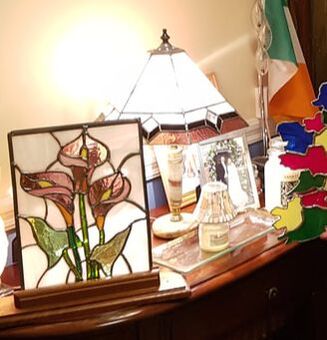 Some of Michael's 2019 stained glass projects - purple lilies, next to the pink and purple table lamp. Some of Michael's 2019 stained glass projects - purple lilies, next to the pink and purple table lamp. Michael is so keen on stained glass work that he bought all the equipment required and supplements his class time with many hours in his workshop at home working on projects. “This year’s project is purple irises on a white background. And I’m trying to design my own seascape including a lighthouse, cliffs, sea – I have to draw it out first, so the new skill for me is to get the drawings and proportions right.” Michael’s skills are so good that his tutor has taken him on for some piecework in his studio. And, when he retires himself, Michael is looking forward to doing as much or as little stained glass work as he wants. He’ll have earned it – he has been working as a chef in the hospital for 47 years. In the meantime, he’s hoping to add to his creations - angels, fish, blue irises, even a map of Ireland (though Limerick did crack and had to be replaced!). “My wife is delighted with the stained glass – we give them away as presents and my stained glass is in homes as far away as Canada and California.” Business classes can help many entrepreneurs get their enterprise off the ground – and up and running successfully Jo and Jason Whyte attended the Start and Grow Your Own Business night class at Scoil Mhuire, Clane Community School, Co Kildare in early 2018. “My Kiwi husband and I live in New Zealand and had returned to spend some time in Clane, where I grew up,” said Jo. “Prior to leaving New Zealand, we had decided that we wanted to set up our own business. With Jason being a Security Engineer, it was a no brainer to pursue an electronic security business. “The course sounded like a perfect opportunity for us as, although we knew what we wanted to do, we didn’t know where to start.” Guest speakers The couple found the course extremely well run and it covered everything that is involved in setting up and growing a business. “Each week, a guest speaker came in and talked to us about their field of work, from an accountant to a web designer. We were also provided with various tools and templates that we could use. The facilitator, Johnny, a business owner himself, was a wealth of knowledge which he readily and enthusiastically shared with us.” Jo and Jason are now back in New Zealand and into the second year of business. “We’re really pleased with where we’re at and feel that the tips and tricks passed on to us by Johnny and everyone involved in the course was a huge part in getting us up and running.” A jewel of a business
Ciara Early always had a passion for jewellery and, a few years ago, attended jewellery making classes as part of the Adult Education courses in Scoil Mhuire. “The course was fantastic, and I learnt all the basic skills for jewellery making,” said Ciara. “My passion and confidence grew from the skills I learnt during the course. “Following on from that, I set up my own jewellery business called Maiden Jewels. Scoil Mhuire’s Adult Education Department is a marvellous outlet right on our doorstep. “I also attended two cookery courses and also the Cognitive Behavioural therapy course with Rita Stanford, which I loved.” 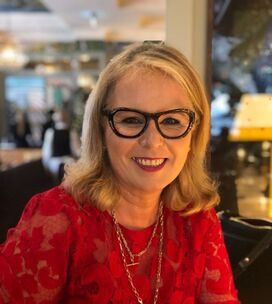 Tara McCarthy, ICB student at Malahide Community School Tara McCarthy, ICB student at Malahide Community School Every year, Tara McCarthy tries to do a night class. This year, she’s undertaking the new Bookkeeping Certificate in Malahide Community School. “I went back to work full-time a few years ago – and did an Excel course when I was going back into the workforce and so that I could do basic accounts. In my new role, I’ll be moving into Finance – I have no formal training in bookkeeping so this new ICB (Institute of Certified Bookkeepers) certificate will teach me bookkeeping and give me a qualification as well. For me, the timing couldn’t be better.” Time out Previously, Tara and her husband did night classes together as a way of spending time with each other and getting time out from parenting their four children. “We did a ballroom dancing class together – I started night classes here in 2010 and try to do at least one a term. “This ICB certificate will help me with my career and it’s nice for the kids to see that education doesn’t finish with college.” Learning network Along with helping her career, the night classes help socially as well. “I’ve made good friends on the courses and still meet up with people I’ve met over the years. On this course, it’s all women of different age groups and professions and it’s really about women supporting women. We go over things at the end of class and Elaine, our tutor, is brilliant and we get support as well from Tena, the ICB representative – that is great because we are learning from a different perspective. That and the ICB resources are a wider support, like a scaffolding, around the class.” Every night class comes with an adult education department behind it and Tara is very complimentary about the team in Malahide. “The staff are brilliant, and they provide a huge number of courses for the whole community.” Tara is so pleased with her progress that she’s thinking of progressing onto Year 1 of the Accounting Technicians’ course! Mariana Jiménez Moreno moved to Ireland in 2010 and, shortly afterwards, she started teaching Corkonians how to speak Spanish! Today, she delivers beginners and more advanced Spanish classes in Bishopstown Community School, Ballincollig Community School, Ashton Comprehensive School, and Carrigaline Community School. And, in September 2019, she and nine of her night class students headed to Cabra, a small town in Andalucia for four days. “This was an immersion experience to enhance their Spanish language and knowledge of the Spanish culture and way of living,” says Mariana, who hails from Madrid originally. “Cabra is a small town and most of the people there do not speak English, so it was an opportunity for the night class students to practice their Spanish. The town is one hour’s drive from Cordoba and Granada, and two hours from Seville, so it was a great base. “The main aim was to learn about the town and to get to know everything about it, the people, the food, the culture.” Meeting needs The Spanish classes in Cork have proved extremely popular. “A lot of different people come to the classes: from people who are in college to people in their 80s. Some people want a few words of Spanish to use on their holidays, or some want to learn Spanish because a family member has married a person from Spain or Latin American and they want to communicate better with them. “In some classes, we have a very wide range of ages. I have students who want to train their mind and learn another language. Some people are retired and want to move to Spain (or already have a base in Spain) or want to learn to speak to Spanish-speaking grandchildren. Or, in the September class, people come to learn Spanish because they have booked a holiday in Spain over Christmas.” Social benefits
As with any night class, the social benefits are enormous. “In some classes, a lot of the same people come back each year. People become friends and get to know about each other’s lives.” In terms of lifelong learning, Spanish is ideal in helping people to navigate social situations on holidays. “In the beginners’ class, we cover the basics, greetings, introductions, then different foods and directions. At the improvers’ classes, the participants know what they need – maybe going to a hairdresser when living or holidaying in Spain. “Every class has a cultural element – so, for instance, at Christmas time, we cover what Christmas is like in Spain, compared to what it is like in Ireland.” And the lucky ones get to visit Spain – lifelong learning at its best! 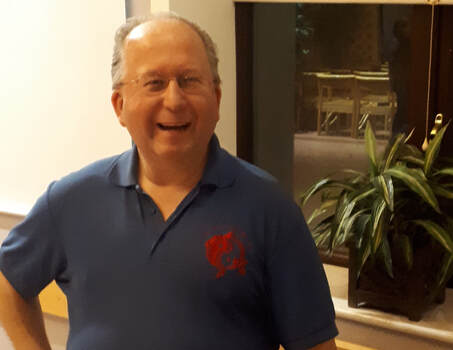 Master Charles Thackaberry, Tai Chi instructor Master Charles Thackaberry, Tai Chi instructor When we think of Tai Chi, we think of slow graceful movements – and, yes, you too can learn those slow moves in night classes across the country. Master Charles Thackaberry is an experienced Tai Chi tutor and has been teaching Tai Chi since 1981. Today, he runs very successful night classes in Gorey Community School, Co. Wexford, right back where he started in the 1980s. “Classes became very popular during the Celtic Tiger years because people realised they needed to take care of themselves,” said Charles, who also runs classes in Dublin. Holistic approach So, what is Tai Chi? An ancient Chinese tradition, it combines a series of slow continuous movements that flow into each other, meditation, and breathing exercises. “You tune into your body and mind,” said Charles, adding that, in today’s fast-paced world, people who are recovering from illnesses find it useful and busy people find it a great way to destress. Charles himself came to Tai Chi as a fan of Bruce Lee when he was a teenager in Enniscorthy, Co Wexford. “I did Tae-Kwon-Do for a few years but was not into the fighting side of it. Then a friend of mine died and I felt like I had no tools to deal with it. I discovered Tai Chi and my teacher told me it was an art for living. Benefits “It’s quite meditative and a lot of our students might come to us suffering from burnout – Tai Chi lets you recover and learn techniques so you can save yourself. It’s very relaxing and calms the mind and can really help with anxiety or physical and mental stress.” Charles also works with people with Down’s Syndrome who may not be able to verbalise stress. “The exercises are geared towards the health side of things, and are ones that help with blood pressure, stroke and the mind.” By working at a physical, mental, emotional and spiritual level, Tai Chi helps bring balance to a person’s body, mind and soul. “A lot of people who don’t sleep well say they always sleep well the night of the Tai Chi class!” said Charles. Full circle In Gorey, the classes proved so popular than an additional night was added, bringing the number of classes available to people to four a week – two on Tuesday and Wednesday nights. “When I started classes in the 1980s, one of the first places that gave me a class was Gorey Community School under the adult education director then, Paddy Conway. It didn’t take off at the time, so it is great to see how Tai Chi is so popular now in Gorey.” NACED schools are the first in the country to introduce a new Certificate in Bookkeeping accredited by the Institute of Certified Bookkeepers (ICB).
“The Certificate is aimed at those who are new to bookkeeping and have little or no previous knowledge or experience,” said Tena Sheil, an accountant and lecturer who has introduced the Certificate to Ireland. “It’s ideal for anyone who would like to work in an accounting role in a small business, for people who would like to run their own bookkeeping business, or for owner-managers who wish to understand the finances of their small business.” It is also very useful for bookkeepers who would like to enhance their experience with a qualification. Schools So far, two community schools have had great success with the Certificate, introduced in September 2019. “Malahide and Gorey are running the courses with good numbers attending – essentially, ICB provides the course materials and the school sources the tutors.” The Certificate in Bookkeeping is made up of five topics: Underpinning Knowledge, Preparation of Business Documents, Accounting for VAT, Entering Transactions, and Reconciliation and Reporting. At the end, successful candidates will be able to show a full understanding of the concepts of double-entry bookkeeping and its place in modern business, enter transactions into a bookkeeping system and produce an initial trial balance. They should be able to reconcile sales and purchases ledger balances against the relevant control accounts and reconcile the bank account. They should also be able to identify and correct errors present in the system. What is the ICB? The ICB is the largest bookkeeping institute in the world, said Tena, who lectures on the ATI course in Gorey Community School’s Adult Education Department and delivers ACCA and CPA professional programmes. The ICB promotes and maintains the standards of bookkeeping as a profession through the establishment of relevant qualifications and the award of grades of membership that recognise academic attainment, working experience and competence. QQI upgrade Significantly, the ICB also offers a conversion course for those who have achieved a Distinction in QQI Level 5 Manual & Computerised Bookkeeping. Both the Certificate and Conversion Course include student membership of the ICB, where members benefit from enhanced professional status, global recognition, ongoing support and the kinship of the world’s most engaged bookkeeper community. The advantage of having an ICB qualification is that ICB qualifications are recognised as the benchmark for the profession across the world, said Tena. Night class participants in Cabinteely Community School are thrilled to be learning Country Jive and Line Dancing with tutor Laura Nolan, who will feature on Dancing with the Stars in January! As well as Country Jive and Line Dancing, Laura is a professional dancer and provides ballroom and Latin dancing classes privately. “My mother was a dancer, so I started dancing when I was three,” says Laura, who hails from Lucan. “I started with ballet, Latin and ballroom dancing until I was 16, got all my ballet exams, and then stopped the ballet. I started teaching at 15!” An accomplished professional dancer, who describes dance as a sport, Laura has an impressive list of achievements. She was a finalist in the U21 World Championship, placing her amongst the top 10 in the world. She and dance partner Alessandro Bosco ranked number five in the World Open in Riga, Latvia, last December. She has won numerous International Open championships and was a finalist in the German Open. In fact, she was the first Irish dancer to compete in the World Championships, so her talent is undisputed. Dancing with the Stars
Having been on the competitive trail with ballroom dancing and focusing on World Championships and representing Ireland, Laura is looking forward to the change of pace with Dancing with the Stars. “The professionals get together to start training in November, then we start with the celebrities in December, and the live shows are recorded in January,” says Laura. “It’s a good opportunity to put dance more into the spotlight – ballroom and Latin dance competitions aren’t televised in Ireland, so this is a good opportunity for people to see dance.” Line dancing What people are seeing increasingly is line dancing as social dancing sweeps the country. “Line dancing is so popular again and it is great to see – dance is amazing for people’s fitness. It’s a great way to burn calories in a chilled relaxed way as it has a fun element to it. “The great advantage to country jive and line dancing is that you don’t have to have a partner – I teach both sides in terms of the steps involved in country jive so that each person can then dance with anyone. “It’s great, people meet others and go to social dancing and start new friendships. People are there to enjoy themselves and do a little dancing. It’s great to see dance so popular.”  Maire Kelly, who secured a H3 in Leaving Cert Irish which she studied at night in Gorey Community School. Maire Kelly, who secured a H3 in Leaving Cert Irish which she studied at night in Gorey Community School. Máire Kelly started to learn Irish seriously in 2017 – and secured herself a H3 in this year’s Leaving Cert! She is now attending Dublin City University, undertaking the four-year Bachelor of Education degree programme. Home-schooled from the age of eight, she has an international qualification that is the equivalent of the Leaving Cert. “But when I decided I wanted to be a primary teacher, I knew that I would need a H4 in Leaving Cert Irish,” said Máire, from Arklow, Co Wicklow. “So I started learning Irish in 2017 – I knew some Irish words but not many. I did an online course at Junior Cert Level and, last year, I went to the Leaving Cert Irish night class in Gorey Community School and got grinds as well.” Máire was not only motivated by her love of teaching but by a love of languages. “My grandparents spoke Irish and I love languages – I learned Russian using a learning language software programme and now I have pen pals in Russia!” Work experience teaching crochet in a local Gaelscoil also helped to improve her Irish and she was able study at home alongside her siblings. “I’m pretty self-motivated and able to work on my own, so I did a lot of study at home to complement the classes.” In Gorey, she found the night class, which runs on Monday and Wednesday nights, hugely beneficial. “The teachers taught us as peers, which was really nice.” This Leaving Cert for Mature Students night class is specifically designed for students who want to improve a grade achieved previously in Irish so that they can gain entry into courses where a minimum grade of H4 is required. These are typically primary school teaching undergraduate courses. The class focuses on the Leaving Cert oral exam or the Hibernia College Irish interview and on the Leaving Cert higher level written exam paper. People who just want to improve their Irish speaking abilities also attend the class! “The Leaving Cert exam was OK – the essays I wanted didn’t come up, but I was able to tie in essays that I had prepared. I preferred the Oral Irish exam – I was asked my favourite sraith pictiúr and poem. “Overall, I found that Irish was a challenging language but I love languages and I really want to be a teacher, so I persevered!” This Autumn sees Crescent College Comprehensive S.J. in Limerick offering a new season of night classes that are as affordable as they are innovative. New courses for this term include Bicycle Maintenance, Greek and Roman Civilisations, Make-up Application as well as Screenwriting, Calligraphy, Ukulele, and Design and Dressmaking for the more creative minds out there.
Among the most popular courses are Dog Grooming, Zumba, Woodcarving, Flower Arranging and Bridge, a sociable and inexpensive hobby which is offered at both beginner and intermediate levels. Lifelong learning “Night classes offer lots of fun and are a great way to meet new people and form new friendships, all while learning a lifelong skill,” said Catherine Scannell, Director of Adult Education in Crescent College Comprehensive S.J. Night class participants will also be able to boost their language skills with classes available in Spoken Irish, English as a Foreign Language, Spanish, French, Japanese, and basic Latin. “Social dancing is a very enjoyable evening and is so popular that the class has been extended to an hour and a half for this term, as has the highly demanded Yoga class. People can also bring their partner to the Social Dancing class.” From chess to cooking Other courses include everything from Tin Whistle to Guitar, Emotional Freedom Therapy, Woodwork/Joinery, Painting with Oils, Creative Writing, and Chess and Draughts. Digital Skills for Citizens, which is free for those over 45, offers a variety of useful routes to upskill in specific fields such as online banking and social media. “There is a sincere focus on what is current and in demand. Cooking for Men has become more and more popular in recent years as it gives men who might not be as confident as their female counterparts in the kitchen a chance to gain some Jamie Oliver-like skills. Cookery for All Grades and Gourmet Cooking classes are also available.” It’s not everyone who would do Irish in the Leaving Cert twice. But driving instructor Dane Tyghe is one such person. He travels to Gorey Community School from Wexford two nights a week to learn more than the cúpla focail.
In June 2019, he will sit down to tackle the Leaving Cert Irish exams, slightly older than others in the room. At 39, he’s doing this for no other reason that to improve his own level of Irish. YouTube “I want to improve my own fluency in Irish,” says Dane, who did Ordinary Level Irish first time round. Now, he’s got a YouTube channel to teach others how to Learn Irish! “I needed a structure to keep me disciplined – in fact, I’d have done five nights if I could have. But the two nights gives you the intensity and the breaks that you need and the tutors, Daniel and Lucy, were great. They’re very approachable and give great feedback.” Whilst others in the class are redoing their Leaving Cert Irish in the hopes of qualifying to train as primary school teachers, Dane is on his own journey. “I really just want to improve on the language. It’s a personal goal for myself. I love the language and how poetic it is.” Motivation He’s also been motivated by what he says is criticism of the language from people in the media or elsewhere. “Some people say they came through school without knowing any Irish, but I think they’re not prepared now to go and learn it. “Others just insult the language – so I decided there must be something to it and I started to learn it myself. I watched TG4 and YouTube videos before I found this course in Gorey. I’d say my Irish was at an intermediate level but I’m well on the road to advanced now.” His Irish has already been tested – during the Oral exam in March. “I went in feeling confident and we had been well prepared. I may have got one or two words mixed up, but I was delighted with the way it went and the examiner was very approachable.” Focused Being more mature has helped in the preparation as well. “If you prepare and take breaks in the study as well, you’ll be fine. At 39, I’m more mature and focused, so that’s good.” He’s also able to surprise learner drivers with his Irish, particularly when teaching Leaving Cert teenagers how to drive! In the meantime, he’s hitting the books in between the driving lessons. “I’m just so grateful that this course was available. If I’d been learning it myself, I wouldn’t have had the same experience.” Next stop? Keep learning! “There’ll always be another phrase to learn,” says Dane. 5K and Beyond – yes you can, in Carrigaline Dave O’Regan may be an accountant by day but, by night, he’s responsible for getting Carrigaline running. For the last few years, he ‘ran’ the Couch to 5K class in Carrigaline Community School, Cork. That class has been so successful that the school has added on a 5K and Beyond night class. The class attracts those who had completed the 5K and wanted to stretch themselves and others who can run 5k comfortably. “Last year, by the end of the 5K and Beyond class, we had people running up to 10k. We add variety to the training so that participants can see different sides of training – it also breaks up the monotony so that we’re not running the same course each week. So, for instance, we do speedwork – four by 400m runs with two minute stops. The idea is to get people running faster than they would normally run.” The group will also do hill repeats and, over time, work up to longer runs around Carrigaline. “It’s very enjoyable – it runs over the 10 nights and I tell them that, ideally, they should do two other runs during the week. That way, they’ll be able for the step up next week.” Couch to 5k
Adult Education Director Gene Cahill now takes the Couch to 5k group. “It’s a 10-week course and the people who see it through are all able to run 5K non-stop at the end of it,” says Dave. “The class is aimed at people who have never trained or run and who want to become more active, or they want to get back running. “People also see it as an alternative to the gym – you’re exercising in an environment where everyone is starting from the same place. Everyone who signs up has little or no fitness.” Pace, not race Building up their times from the first night to the last, the class is all about pacing yourself, not running yourself ragged – more the tortoise than the hare, slowing down to speed up … During the winter months, the group, which can number up to 20 people, jog a loop around the school. But, when the time changes in March and the evenings are longer, they let loose down around Crosshaven. 10K and counting “I get a lot out of it. I love running so it’s almost like giving back – I’m happy to encourage others to run or do something healthy.” If you want to trip the light fantastic, head to Bishopstown Community School where tutor Kay Herlihy will put you through your moves.
Kay has been teaching ballroom dancing for the last number of years, with the waltz, foxtrot, slow waltz, quick step, and tango among the signature moves taught. Rock and roll and the cha cha are other dances also on the menu. “I love ballroom dancing, I’m addicted to it,” says Kay. “I took lessons myself in Cork Dance Club – I still go! Dance classes are great places to make friends, and have some banter and craic.” Popular classes Kay’s classes are such a success that people come back year after year to help out, particularly the men. “More women sign up for ballroom dancing, so sometimes some of the men from previous years come back to help pair up with someone for the dances. The idea is that you rotate your partner.” Couples, old and new, also sign up for the classes – and Kay has helped many a bride and groom to prepare for their first dance. Stay social, keep fit Indeed, her own husband was her dancing partner for many years. “We started dancing 20 years ago and I went ahead and did the exams.” An accomplished set dancer as well, she says there are plenty of dancing opportunities in Cork. “People can go social dancing in Ballincollig, Cobh, Douglas, Midleton or Mayfield. You’ll find dancing on at different GAA clubs. I always tell my classes that they should get out and practice.” Not only is dancing a sociable activity, it’s a great way to keep fit. “Set dancing is more energetic, but people love the slow waltz or the slow foxtrot. You’d often see people dancing as if they’re a pair of gloves, a perfect fit. Dancing in general is a great hobby, you mix with every walk of life but you have no idea what they do as a day job. We’re all just there to learn. And you forget your troubles and focus on the enjoyment of the dance!” |
